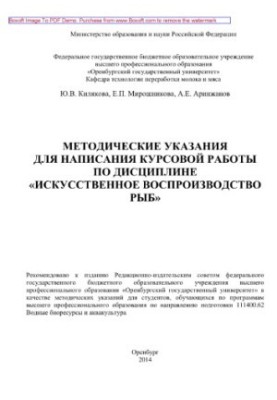Methodical instructions for writing coursework in the discipline "Artificial reproduction of fish". Methodical instructions
 Instant download
Instant download
after payment (24/7)
 Wide range of formats
Wide range of formats
(for all gadgets)
 Full book
Full book
(including for Apple and Android)
The book "Methodical instructions for writing a course work on the discipline "Artificial reproduction of fish" . Methodological Guidelines" is an indispensable resource for students, graduate students and anyone interested in aquaculture and fish breeding. Created by a team of authors, this work offers readers not only theoretical foundations, but also practical recommendations that will help to successfully cope with the writing of a term paper on this relevant and important topic. In a world where sustainable development and environmental protection are becoming increasingly important, artificial fish reproduction plays a key role in restoring fish stocks and ensuring food security. This book immerses the reader in the fascinating world of aquaculture, revealing the main aspects related to the reproduction and cultivation of fish in controlled conditions. Readers will be able to learn about modern methods and technologies used in this field, as well as the importance of artificial reproduction for ecosystems and the economy. Who can like this book? First of all, it will be useful for students studying biology, ecology, fish farming and related disciplines . It will also interest graduate students and researchers working in the field of aquaculture, as well as practitioners seeking to update their knowledge and skills. In addition, the book may be of interest to anyone who wants a deeper understanding of the problems associated with the protection of water resources and sustainable development of fisheries. One of the key topics raised in the book is the importance of a scientific approach to the artificial reproduction of fish. The authors emphasize the need to use modern technologies and methods, such as genetic selection, control of environmental conditions and feeding, which allows to significantly increase the efficiency of production. They also discuss ethical aspects related to human intervention in natural processes, making the book relevant for those interested not only in practical but also philosophical issues in the field of ecology. The style of the authors is distinguished by clarity and accessibility of presentation, which makes the material understandable even for readers who do not have deep knowledge in the field of biology. The book is filled with examples from practice, which allows the reader to better understand the theoretical aspects of . In addition, it contains recommendations on the structure of the course work, which will help students organize their thoughts and ideas into a logical and consistent presentation. If you are looking for similar works, pay attention to books devoted to aquaculture, ecology and sustainable development. Names such as Aquaculture Fundamentals and Aquatic Systems Ecology can complement your knowledge and broaden your horizons in this field. In conclusion, "Methodological guidelines for writing coursework in the discipline of "Artificial reproduction of fish" . Methodological Guidelines" is not just a manual for students, but also a valuable source of knowledge for all who are interested in the future of fisheries and the protection of water resources. This book will be your reliable assistant in research activities and will help you to better understand the important aspects of artificial reproduction of fish, which, of course, makes it worthy of attention.
LF/11554345/R
Data sheet
- Name of the Author
- Collective of authors
- Language
- Russian
- Release date
- 2017





















